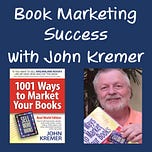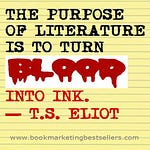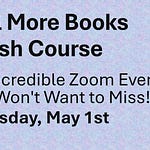Here is the edited transcript of most of this episode:
John Kremer: I want to welcome everybody to another episode of The Book Marketing Success Podcast. Today I'm featuring my great friend, Judith Briles. She's the author of many books, including How to Create a Million Dollar Speech.
She will talk about speaking both as a tool for promoting yourself has an author as well as using speaking as a great way to create content.
Judith Briles: It's a dual edged sword. There are so many things that you can do with speaking. And, the number one thing is you can sell a boatload of books.
That's what I call the cash cow two-step, combining your words and your speaking. Together, they're dynamite.
Ask yourself: Who are you writing for? Who are you reaching out to? Once you figure that out, that connection is already off and running. And when you can now bring the verbal side to it, and the how to, or the storytelling, or whatever it is that you as an author are writing about. It's the way to really connect—and where people want to take you home with them. And since they can't usually physically take you home with them, your book would be the next best thing in most cases.
John Kremer: Another way that it works is that they can also take you home, via the audio and videos that you create, from your speaking engagements and your podcast episodes. I mean, I take you home every week via your wonderful podcast.
Judith Briles:
I think that is an evolution. I actually started out as a speaker before I ever wrote anything. At the time, there was no such thing as blogging, there was no email. But I would write articles.
When my first book came out, which was going to be the one and only—no one told me that books bred by themselves. Then people said, well, we want you to come and talk on your book. And it was a while before I really got that this is the way to move.
I am a recovered New York publishing snob. I used to believe that “Oh, only legitimate authors are published in New York.” I did 18 books with the big boys before I finally crossed the bridge.
It all started because of speaking. I was speaking to a group in Seattle, and I got a call and they said, “Judith, could you reach out to your publisher and ask if we could get maybe a little discount if we bought a few of your books?”
Well, I had just taken back the rights to the book. I bought the remaining stock, which consisted of 60 copies. And I said, “I'm sure I can make an arrangement. How about if I could get you a third off?”
And they say, “Oh, that'd be so great. So tell them we'd like 1000 copies.”
Well, that was the giant goal. I actually needed to do a revamping of the book. And that's how I crossed the bridge. And once I did that, and figured out how much faster and timely and how much I could control it. And, oh, I can make more money. I never looked back. Never look back.
John Kremer: Right. It's really great, especially in your case where you ended up having to print more books, which a publisher would have taken weeks and weeks and possibly years to do?
Judith Briles: Yes, I had to do the rewrite. And then I had to find a cover designer, and I had to find a layout person. I had to do all that and I was totally ignorant.
The only mistake I made in that process was that I knew nothing about manufacturing and printing books. And I probably paid twice as much per book to do that. But I was able to negotiate enough books. I had a 2,000 copy first run for the book. They wanted 1,000 copies. Then they immediately came back and wanted 500 more copies. And, you know, I was in the green.
John Kremer: That's one of the really neat things about speaking: not only can you get paid to speak, but you can sell your book as well. And they will often buy copies for everybody in the audience, or all the members of their association.
Judith Briles: Well, I had the formula down. I was a traveling store by the time this thing really got rolling. And we knew, depending upon the time of day, how many books we would sell, for the audience, for the time of day, if I was opening in the middle, if I was the keynote, or I was a workshop person, or if I was the closing person. I mean, they could love you, you could rock the roof, but half of them are already gone, because they just want to go home. And, if you’re the evening speaker, rarely did you sell much in books, because they may love you but they wanted to get home.
I have always been very transparent on what my book sales and speaking fees are. I sold over a million books this way. I grossed over $2 million dollars. At the same time, I made over $3 million more in speaking fees. So I think people are nuts not to be speaking on their expertise.
John Kremer: I agree with you on that. When I talk about ways to market your books, probably my number one way is speaking.
Judith Briles: Number one, number one.
John Kremer: Because you control it for the most part. You don't have to rely on the bookstores to sell your books or a catalog to pick up your book or TV appearances or anything. You just start booking yourself as a speaker.
Judith Briles: And when you sell your books, you get paid on the spot and nobody returns them. That's an author's dream.
John Kremer: Non-returnable is definitely an author's dream. I remember selling my book sometimes when people would come up with cash. My book was $19.95, but they would give me $20. I made five cents extra.
Judith Briles: No, we always rounded our numbers. But the other thing I told people at gigs, because you're there, you're there to sign your fabulous book. You're not discounting, sweetheart. Why should you discount? So my books were marked at $20 and $25. I actually raised prices on books. I did have one book that went for $35. I had one book for $29.
Once you start having multiple books, you could put bundles together. We offered a six pack. And then it was like they got a free book in the six pack via the price and we would bring that down. We were like a traveling store. It made a lot of difference. It really helped.
I started pre-selling a book six months before I ever had it in hand. Six months I was starting to collect money.
John Kremer: That's one of the things I really liked about self-publishing. When I first came out with 1001 Ways to Market Your Books, it was called 101 Ways to Market Your Books. I actually pre-sold three books in a deal. And so I had to write them (because I hadn't written any of them when I offered the deal). 1,000 people paid me up front for the book deal.
Judith Briles: And that pays for your whole print run. It pays for so much when you're ready to go. But you know, you do have to use the money for what you're going to deliver people. And the only deal I offered for the presale group is I covered shipping. I would eat the shipping cost.
John Kremer: Can you tell us some of your inside secrets of how to book a speaking engagement and to get the ones that buy 1000 copies?
Judith Briles: Well, at first, I didn't know that they were going to buy 1,000 copies. But it was the topic. I had three distinct areas that I spoke on. One was from a financial background, when I was with EF Hutton, long ago, the token woman stockbroker. That's how I started speaking. Someone asked, “Hey, can you come over and speak to a group of us in the East Bay?”
And I said, “Yeah, I could.” And, I did so many things wrong from a presentation side of it, but I realized I knew a lot of stuff. Once I figured out how to start doing this structure and get it sequential, it was hot. So I started in the financial area
I then went back to school and earned my doctorate. My thesis was on ethics. And the topic was: Do women undermine other women? I discover that was going to be the ultimate lemonade stand. It propelled me into major media, from the Wall Street Journal to the National Enquirer, an unbelievable media magnet
I thought I was writing for the corporate woman, but I was actually writing for the people who would buy my services. Corporations were scared to death of me. I said to them, “I don't get this. You do programs on sexual harassment. But it’s often women undermining women.” Men don't discriminate was one of my pitch lines.
Contrary to popular belief, men don't discriminate. They will equally shaft anybody. Women, though, are more inclined to undermine their own gender. But that idea was taboo.
But, then, my audience came and found me. It was called health care—a predominantly female dominated workplace that had toxicity woven through its blood veins. They always wanted zapping conflict in the workplace or sabotage: how to deal with the pitfalls skunks snakes scorpions insolence in the healthcare workplace. And anybody who worked in healthcare knew exactly who I was talking about. The book sold itself.
That was what carried me for a long time. And then other things, came along. I've transitioned because I've always helped people with books, introducing people to my agent, etc.
Then I got injured in a hotel accident, slipping on the marble floors, and ended up with a brain injury. I couldn’t do the work I used to do. For a while I was wheelchair bound. I couldn’t travel. I couldn’t do math.
How was I going to take care of my family? Well, when I was able to start speaking again, I began helping people with their books.
The gift that came to me is when I'm talking to someone about their book, I see it. I see how it's supposed to lay out. I see how it's supposed to structure. I see it. So that was the new gift that came to me.
Do I still speak when I'm asked to? Absolutely. I love to speak. I love to share. I love to talk about kick-butt book marketing. I love to try to inject the fun that marketing is instead of feeling like it’s overwhelming all the time.
John Kremer: I think people are often afraid to speak. And I think there are a lot who say, “Oh, I don't want to do that. I would shake in my boots.” But in my own experience, if you've done it a few times, you start to really enjoy it. And I think that most people that start to speak and get used to it, actually start to enjoy it. I started pushing people off the stage to get to speak. They took too long to introduce me!
Judith Briles: Some people would rather die than speak. But the public needs to hear that you wrote this book. Why should you speak? Because you're a problem solver. I've always said that it's not money that makes the world go around. It’s problems. We authors are problem solvers. We're problem solvers.
I had an epiphany. If you don't start taking some of your own ideas and write about them or speak them, other people will. …
Part of my speaking contract specified that I had an educational table—and not in the back of the room where I was speaking, but out in the exhibit area, near the bathroom or registration where the traffic was. My record in five hours: I sold 560 books, one book at a time. And that was a gross income of $16,000 and some change.
For the nonfiction writer, here is how you create a speech. You have chapters. Each chapter is a key point. Then ask what's your point? How are you going to reinforce it? Is it going to be with an alarming statistic? Is it going to be with an awesome story? How are you going to set it up? And then, are you going to have an activity or an exercise within it? …
It's always smart to have an opening story and a closing story. Tell stories that are yours, not anecdotes from other speakers. Tell signature stories that are your own.
When, for example, I'm talking about conflict, I often tell a story about how I ran into the back of an elephant because I wasn't paying attention. Then I would compare it by saying that some of the people you have to work with are equivalent to running into the rear end of an elephant. Hey, point made. Now move on. …
John Kremer: It’s easier to sell when you're in control of the pace of what you're telling. Q&A really interferes with that rhythm. That's why you always go back to make that one final point. So you're back in control.
Judith's website: https://thebookshepherd.com
AuthorU: https://authoru.org/april.html
Website: https://www.bookmarketingbestsellers.com
1001 Ways to Market Your Books: https://amzn.to/3ICjpAs
SnipFeed: https://snipfeed.co/bookmarketing
Ask me a question and I'll answer back with a video: https://snipfeed.co/bookmarketing/shoutouts/U2hvdXRvdXQ6NjIxZjBmNDFkNTVjODUwMDIzZWQxMzk5
Book me as a podcast guest or be a guest for my podcast. Connect here: https://www.matchmaker.fm/podcast-guest/john-kremer-bd46ec
Or just buy me a cup of coffee! - https://www.buymeacoffee.com/BookMarketing















Share this post